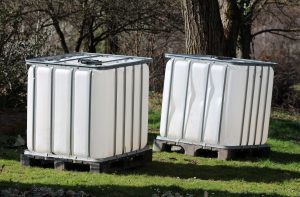Handling Intermediate Bulk Container (IBC) waste can be challenging for many businesses. Whether you operate a small laboratory or a large industrial facility, dealing with waste materials stored in IBCs requires specialised knowledge and equipment. Improper disposal can lead to environmental hazards and legal issues, making it crucial to manage this process efficiently.
One significant challenge is ensuring that waste is removed and disposed of in an eco-friendly manner. This involves understanding the relevant legislation and utilising processing facilities that can handle the waste safely. Many businesses struggle with this due to a lack of expertise or resources, leading to potential compliance risks.
Fortunately, there are expert services available that can help you navigate these challenges. By leveraging professional IBC waste disposal services, you can ensure your waste is dealt with responsibly and in line with regulations. These services provide end-to-end treatment, making the process smoother and more efficient for your business.
Challenges in Handling IBC Waste Disposal
Handling IBC waste disposal comes with several challenges that businesses must address to ensure compliance and efficiency. One primary challenge is the proper identification and segregation of waste. Different types of waste require different disposal methods, and incorrect identification can lead to improper handling and potential environmental hazards.
Another significant challenge is logistical complexity. Managing large volumes of waste, especially for bigger industrial operations, requires precise coordination. IBCs are bulky and heavy, making their transportation and storage difficult. Without proper planning and equipment, you could encounter delays and increased costs.
Safety is also a major concern. Handling hazardous waste materials stored in IBCs poses risks to workers. Ensuring that all safety protocols are followed and that staff are adequately trained is crucial. Failure to adhere to safety standards can result in accidents, legal penalties, and health issues.
Eco-Friendly Solutions for IBC Waste Management
Eco-friendly solutions are essential for managing IBC waste responsibly. One effective method is to employ waste-to-energy processes. This technique converts waste materials into usable energy, reducing the environmental impact and providing an additional resource.
Recycling is another valuable solution. Many IBC materials, such as plastics and metals, can be recycled and repurposed. Implementing a robust recycling program helps minimise waste and supports sustainability efforts.
Utilising professional IBC waste disposal services that prioritise eco-friendly practices is also crucial. These services offer comprehensive solutions, from waste collection to processing and disposal. They ensure that all waste is treated following environmental regulations, helping your business maintain compliance and reduce its ecological footprint.
Choosing green packaging and containers can further enhance your waste management efforts. Opt for IBCs made from recycled or biodegradable materials to support environmental sustainability. Ensuring proper cleaning and maintenance of reusable IBCs can extend their lifespan, reducing the need for constant replacements and further minimising waste.
Best Practices for Complying with IBC Waste Disposal Regulations
Compliance with IBC waste disposal regulations is crucial for avoiding legal issues and ensuring safety. Here are some best practices to follow:
1. Understand Local Regulations:
Different regions have varying rules for waste disposal. Study the specific regulations that apply to your area. Keeping updated with changes in the law also helps maintain compliance.
2. Proper Labelling and Documentation:
Label all IBC containers accurately, indicating the type and nature of the waste. Keep detailed records of all waste disposal activities. Documentation should include the origin, type, and quantity of waste, as well as disposal methods used.
3. Training Staff:
Ensure all employees handling IBC waste are trained in safety procedures and regulatory compliance. Regular training sessions help staff stay informed about best practices and any changes in regulations.
4. Use Certified Disposal Facilities:
Work with disposal facilities that are certified and comply with regulations. These facilities are equipped to handle, process, and dispose of waste properly.
5. Routine Audits:
Conduct regular audits of your waste management practices. Audits help identify any lapses in compliance and allow for timely corrective action.
Tips for Choosing a Reliable IBC Waste Disposal Service Provider
Selecting a reliable service provider for IBC waste disposal is essential for effective waste management. Here are some tips to help you choose the right one:
1. Experience and Expertise:
Look for a provider with extensive experience in IBC waste disposal. An experienced provider will understand the complexities and requirements of handling different types of waste.
2. Advanced Equipment:
Ensure the provider uses advanced, non-destructive equipment. Quality equipment ensures efficient and safe disposal practices.
3. Comprehensive Services:
Choose a provider that offers comprehensive services, including waste collection, transportation, and disposal. A full-service provider ensures a seamless process from start to finish.
4. Eco-Friendly Practices:
Make sure the service provider prioritises eco-friendly solutions. Providers committed to sustainability help minimise environmental impact.
5. Compliance and Certification:
Verify that the provider complies with local regulations and holds necessary certifications. Certified providers are more likely to follow best practices and regulatory requirements.
6. Customer Reviews:
Check customer reviews and testimonials. Positive feedback from other businesses can indicate reliability and quality service.
Conclusion
Overcoming the challenges of handling IBC waste disposal is essential for maintaining safety, compliance, and environmental stewardship. By understanding associated difficulties, such as proper waste identification and transportation logistics, businesses can better manage their waste disposal processes. Implementing eco-friendly solutions like waste-to-energy processes and recycling further supports sustainable waste management practices.
Following best practices ensures compliance with local regulations. Training staff, proper labelling, documentation, and using certified disposal facilities are vital steps in this direction. Regular audits help maintain high standards and address any compliance lapses.
For expert IBC waste disposal services, trust iVAC WA. Our team offers safe, efficient, and eco-friendly vacuum waste management solutions tailored to your needs. Contact us today to learn how we can help you manage your IBC waste responsibly.

